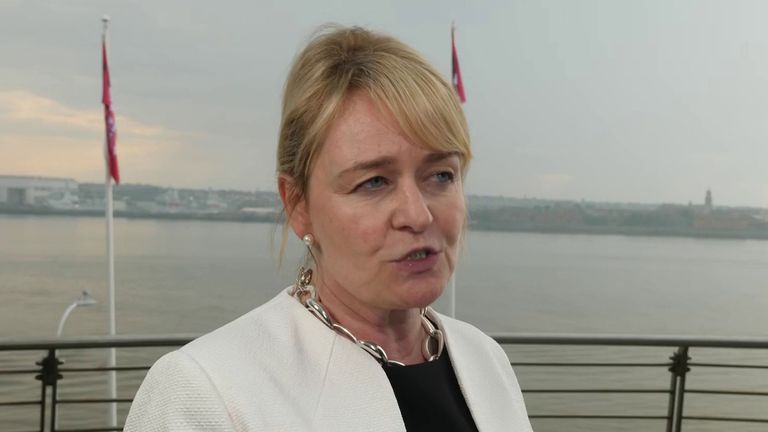Angela Rayner’s seven point plan for workers’ rights sets Labour up for key battle with Tories – if they’ve got the stomach for it | Politics News
Tomorrow is the first real test of how bold Labour are prepared to go in this conference season – possibly the last before the general election.
Two hundred miles north of Westminster in Liverpool, the party’s deputy leader Angela Rayner will tell the Trades Union Congress about plans to strengthen workers’ rights and union rights, which in the past has been one of the most kinetic and controversial parts of Labour policy agenda.
The tone she takes, the content she emphasises and the measures she includes – and leaves out – will reveal much about whether, behind the scenes, Labour is really as confident as it wants to project.
Should Labour choose, this could be one of the most fundamental diving lines of the next election and a key part of Labour’s template for change – opening clear red water between them and the Tories and nudging the national consensus towards workers and away from employers after 13 years of drift in the other direction under Tory rule.
It includes the first steps in the return to mass collective bargaining and a new right to ignore bosses at weekends.
Yet the spin from the top is reassurance, not revolution
“We want a return to a new Labour settlement on Trade Union laws. This is about a new working partnership with the unions,” a Labour source told Sky News.
“The New Labour settlement – which had near zero strikes – is our aim,” they added – language designed to appeal to business leaders not appease union barons.
Others worry some parts of Keir Starmer’s regime appear more than happy to form an alliance with the most truculent left wing Labour union, Unite, to imply this whole agenda was watered down just before the summer at the National Policy Forum discussions between party figures and trade unions.
Anything that jeopardises the headline priority – growth – and impedes improving relations with the unions, is not a priority, they believe.
Yet this all comes at a cost.
“I do worry we’re not prepared to be exciting enough,” said one member of the shadow cabinet wanting the party to go big on the rights agenda.
While some changes to water down the agenda were indeed made pre-summer, and a couple of policy details softened, the vast swathe obtained by Sky News suggests a more meaty agenda than many realise – including a bill promised in the first 100 days of government.
Sky News understands the overall package includes:
Gradual return of collective bargaining through “Fair Pay Agreements”.
This is potentially the most far reaching and controversial change, with Labour naming social care – a sector they believe is in massive crisis – as the first sector they intend to target for a new system.
New bodies would negotiate minimum terms and conditions binding on all employees in a sector. This could mean some sectors could have a higher minimum level of pay than the minimum wage. The agreements could cover pay, pensions, working time, holidays, health and safety and training.
Labour concedes this will take time – “we need to get the architecture right” – and that this will not be right for many bits of the economy.
Ban fire and rehire
At the moment business is meant to make contractual changes to employees’ working conditions through agreement but they currently have the right to do so unilaterally by terminating their contracts and re-hiring them on new ones.
This is designed to be used only in “exceptional” circumstances only by Labour says it’s being abused. Labour has committed to outlawing this practice by “adapting unfair dismissal and redundancy legislation to prevent workers being dismissed for failing to agree to a worse contract”.
“Day 1” employment rights
At the moment the law leaves workers waiting up to two years to access some of their rights. Labour says it will end this “arbitrary” system and scrap qualifying time for basic rights, such as unfair dismissal, sick pay, and parental leave.
Labour is keen to stress this is not a two year ban on dismissal and would not impact anyone being given a probationary period by their employer.
Ban on “exploitative” zero hours contracts
This will give employees the right to request a contract reflecting the hours they work after they have been there 12 weeks. Workers will have a right to decline to use this right. Labour says some details still need to be worked through on how to do this, and this is one of the areas where the provisions have been watered down before the summer.
Repeal of 2016 Cameron and 2022 Sunak anti-union legislation
Labour says this will rewind the clock to the 2010 settlement on trade union laws. The 2016 Trade Union Act introduced a new requirement of 50% of union members to vote in a ballot for strike action.
They would also change the laws to allow strikes by electronic ballot rather than on paper which the party argues brings it in line with how the Conservative Party elect their leader.
Click to subscribe to the Sky News Daily wherever you get your podcasts
Right to switch off
Labour said last year they would bring in a “right to switch off” so working from home does not become homes turning into 24/7 offices.
Labour says it is looking at Belgium, where from April companies with 20+ employees must have a written document setting out a policy on the right to disconnect, Italy where “smart workers” whose job takes place partially off premises must have a written agreement where bosses “specify technical and organisational measures” so workers have a “right to disconnect from company devices” and Ireland where there is a new code of practice.
However Labour is clear this does not mean you can “never” speak to employees outside working hours, and point to evidence that overseas these new rights are not a regular feature of tribunals. In Ireland, for instance, the code has meant employees are adding disclaimers to their emails explaining they don’t expect an urgent response.
Minimum wage
Last year Labour called for the minimum wage to be a minimum of £10 per hour. However the government raised the rate from April to £10.42 for over 23s from £9.50 so Labour may up the ante this conference season. Labour has previously said it would ban unpaid internships except when they are part of an education or training course.
The Tories are desperate to make give this agenda the highest profile possible, and expected to go further tightening strike laws in the coming days. They want to implement anti strike laws passed last year making unions responsible for minimum levels of workforce in certain sectors, and need to pass secondary legislation to make this work. This is a fight that they want. Will Labour let them have it by leaning into the issue from tomorrow?





